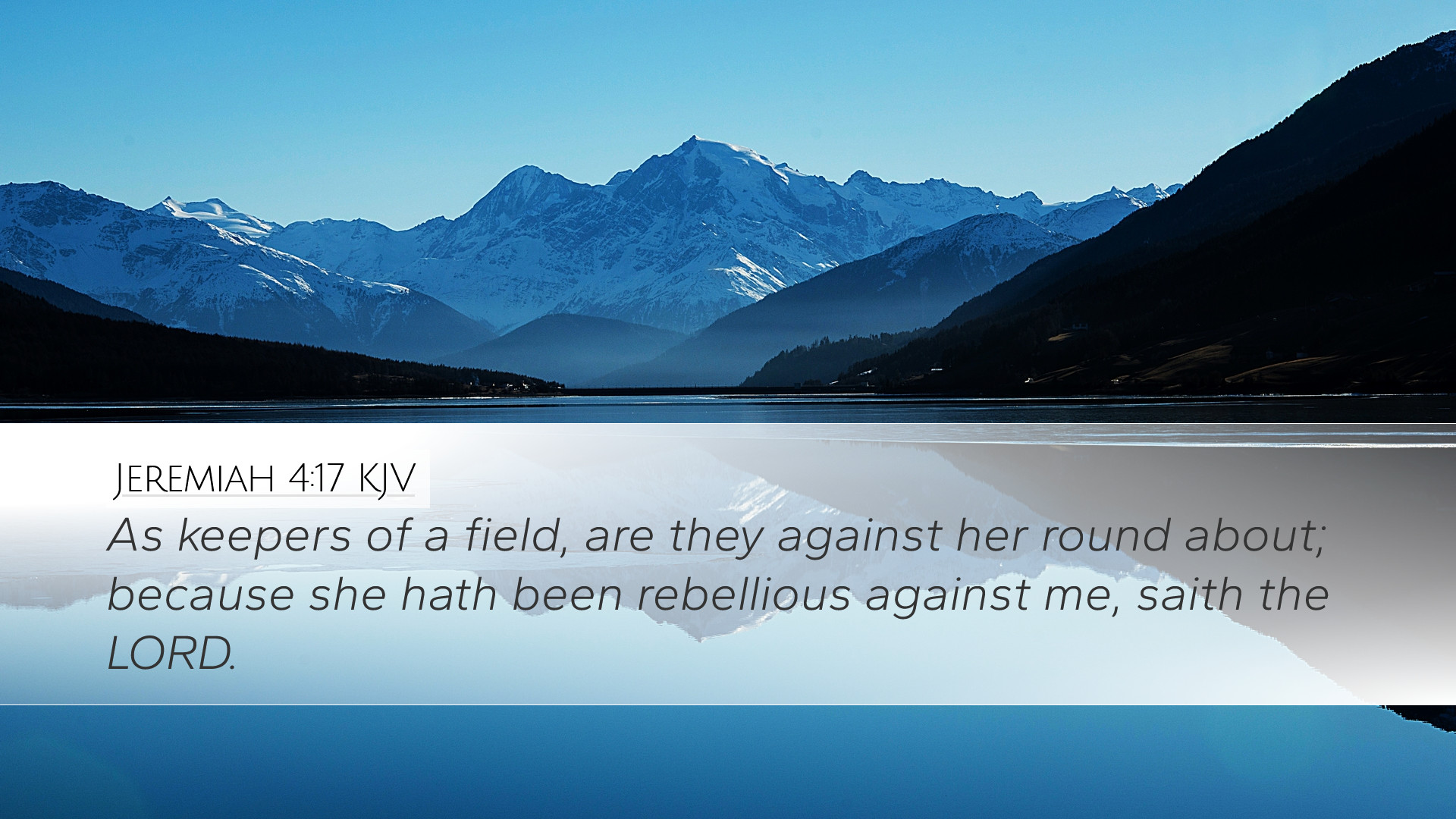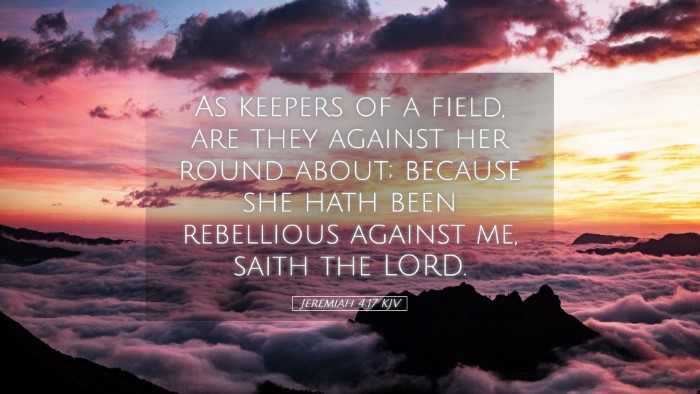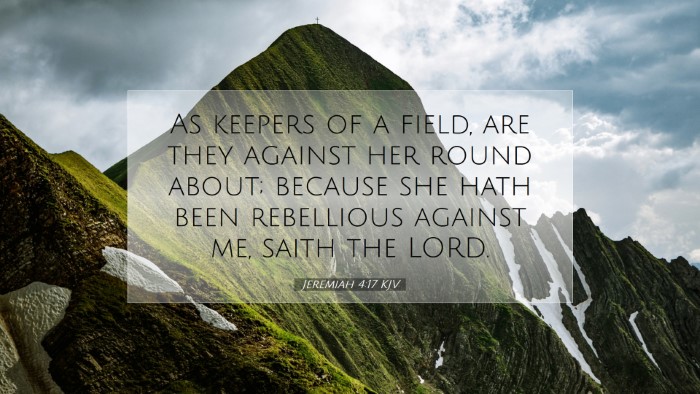Commentary on Jeremiah 4:17
Verse Context: Jeremiah 4:17 states: "As keepers of a field are they against her round about; because she hath been rebellious against me, saith the Lord." In this verse, God describes the role of the surrounding nations in relation to Jerusalem and Judah, highlighting their role as watchmen witnessing the rebellion of God's people.
General Overview
This verse falls within a larger prophetic context where God, through Jeremiah, warns the people of Judah about the impending judgment due to their persistent disobedience. Throughout the book, Jeremiah emphasizes the consequences of turning away from God and the inevitable calamities that follow such actions. The imagery of "keepers of a field" encapsulates the watchfulness and the impending destruction that surrounds the cities of Judah.
Insights from Public Domain Commentaries
Matthew Henry's Commentary
Matthew Henry elucidates that the phrase "keepers of a field" symbolizes the nations that have been set as guardians over the land. They observe the rebellion of Judah with an intent to act, reflecting the providential control of God over nations. The watchmen serve both as protectors and as instruments of judgment. Henry emphasizes that the defiance against God not only incurs divine judgment but also awakens the awareness of neighboring nations, who then prepare for God's impending punishment.
Henry also points out that God's people have a responsibility to remain faithful and obedient, for their rebellion invites scrutiny and judgment. In essence, Henry stresses the idea that faithfulness not only impacts the individual or the nation but also affects their standing in the eyes of the world.
Albert Barnes' Notes on the Bible
Albert Barnes interprets this verse in the context of divine retribution. He notes that the "keepers of the field" serve to highlight the imminent siege and destruction of Judah, which is a direct consequence of their actions. Barnes explains that the surrounding nations are likened to watchmen who are keenly aware of Judah's rebellion and are thus waiting for the moment to pounce. This portrays a scenario where the consequences of unfaithfulness become a spectacle for all to see.
Barnes emphasizes the notion that divine retribution is both just and deserved. He reflects on God's patience previously exhibited, but here indicates that such rebellion brings about a tipping point, inciting judgment. This calls for deep reflection among students of the Scriptures as they consider the nature of rebellion against God and the accountability that follows.
Adam Clarke's Commentary
Adam Clarke provides an analytical take on the roles of the surrounding nations. He describes them as looking upon Judah's state with anticipation, recognizing that as guardians of the field, they hold the responsibility to act against the burgeoning rebellion. Clarke discusses the prophetic nature of Jeremiah's warning, noting that the observance by these keepers of the field signifies a broader spiritual awakening among the nations regarding God's justice.
Clarke deepens the theological implications by suggesting that every act of rebellion is attended by visible and invisible consequences, drawing a parallel with the Christian's responsibility today to remain vigilant and upright. Keeping one's field (spiritual, moral, and societal) is a collective responsibility that resonates through time, urging a reflective stance on contemporary disobedience.
Theological Reflections
This passage offers deep theological reflections, especially related to the sovereignty of God and the consequences of national sin. The portrayal of God as a vigilant overseer—who uses both nations and natural events to enact His will—challenges modern interpretations of divine justice.
- The Sovereignty of God: God remains in control even as nations rise. The verse illustrates that God uses the surrounding nations as instruments of His will.
- The Nature of Rebellion: The rebellion is not personal but communal, highlighting the critical responsibility of a nation to uphold divine statutes.
- Warning and Opportunity: Through such warnings, God’s desire is repentance and restoration, indicating His ongoing invitation for a return to His ways.
Application for Modern Believers
The insights derived from Jeremiah 4:17 compel believers to consider their spiritual fields and the implications of their actions. Contemporary readers must evaluate their faithfulness to God amidst societal pressures that may lead to spiritual complacency.
- Personal Responsibility: Just as the keepers of a field were vigilant, believers are called to be alert and aware of their spiritual state.
- Community Impact: The actions of individuals reflect upon the larger community, urging cohesive obedience to divine principles.
- Hope in Judgment: While judgment may be inevitable, God's faithfulness is a perpetual reminder that He seeks restoration over mere punishment.
Conclusion
Jeremiah 4:17 serves as a poignant reminder of the serious consequences of rebellion against God. With insights from esteemed commentators, this verse emphasizes the role of witnessing nations as instruments of God's judgment. It challenges contemporary believers to cultivate an attitude of vigilance and repentance in their spiritual lives, ensuring they remain within the protective covering of obedience to God. Through their steadfastness, they can affect not only their own lives but also their communities and nations, striving always to uphold the righteousness that God calls them to.


